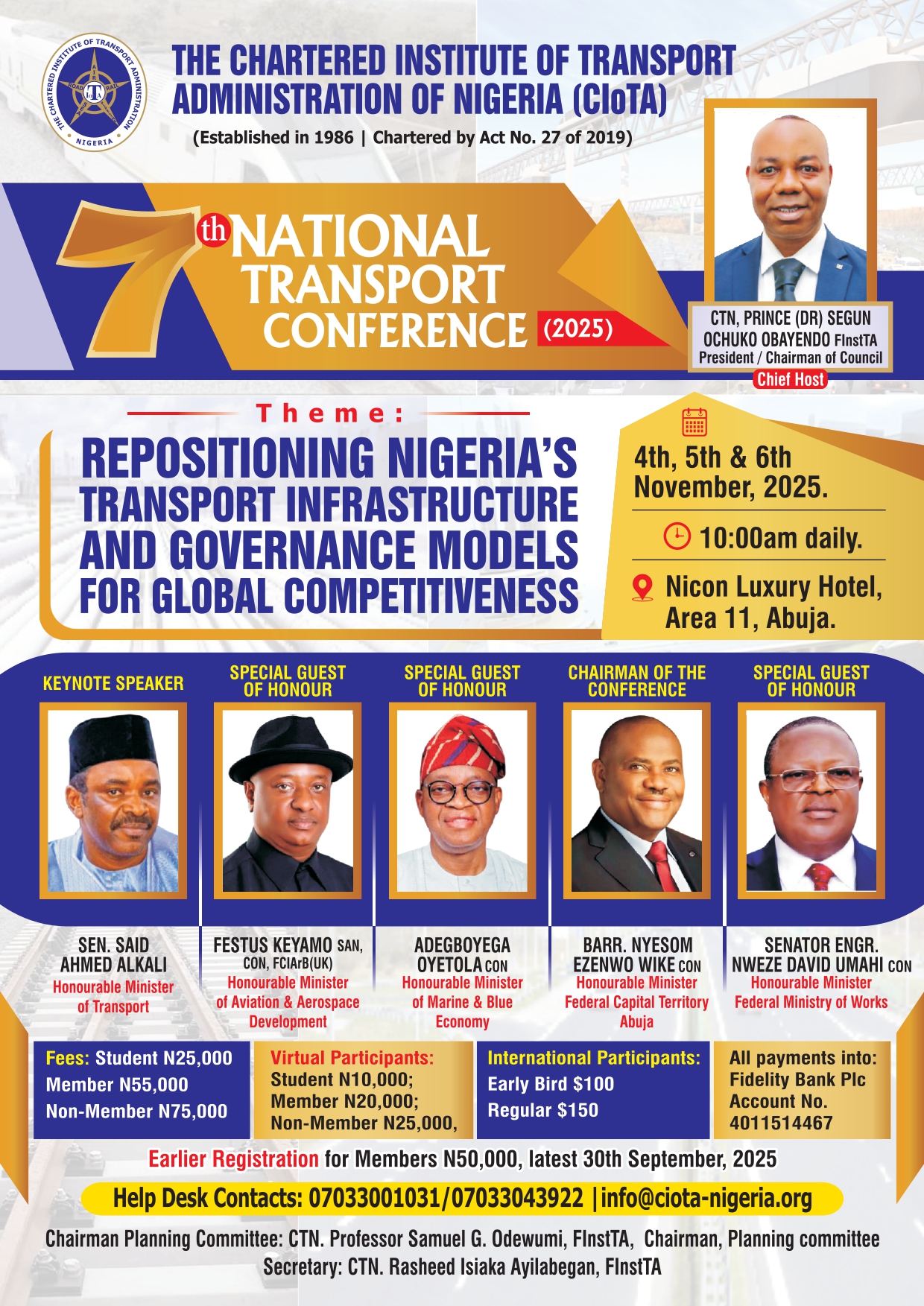Ciota Explores Tech-based Strategies to Transform Nigeria’s Transport Sector
Nigeria’s bid to enhance the transportation sector for more economic and logistics benefits could be realized via strategic technological approaches via funding and support of tech-driven transport platforms.
Transport experts suggested this while offering several other solutions to Nigeria’s transportation woes during an online summit organized by the Chartered Institute of Transport Administration (CIoTA) Nigeria yesterday.
At the CIoTA symposium, themed “Innovative Transportation Management Solutions: Options for Nigeria,” the lead paper presenter, Prof. Innocent Ogwude, harped on the need to support tech-based transport solutions.
Prof. Ogwude noted that several students in tertiary institutions across Nigeria have developed commendable prototype transport innovations that could be harnessed for the country’s benefit and exported to other nations.
His words: “We need to develop a technological approach to transportation in Nigeria.” Technology is being driven by students in Nigeria as well. I’m aware that at the Federal University of Technology, Owerri (FUTO), some students have designed prototypes that are tech-driven. As I go to Akure to examine students, I see that they have developed smart parking lots and smart cars. “We need to visit these institutions and support the scientists as they develop those prototypes into something we can sell to the world and utilize to enhance our transportation system.”
Ogwude, however, insisted that tertiary institutions should not only look towards creating modern technological solutions to the problem at hand but also examine the option of creating products that would be internationally marketable to generate foreign exchange for the country.
Prof. Ogude also stated that there was a need to leverage technology to curb the transport quagmire as the world evolves through the fourth industrial revolution, encouraging Nigerian scientists to work towards developing technology to make the movement of goods and services seamless.
“There is a need for us to develop the technology that will drive transportation to show the world that we were the first to introduce transportation that is flexible.” The Nigerian Institute of Transport Technology (NITT) has an interesting database now. They have now begun to automate a transport database, and it is going to be technology-driven, but it will take a while before it is available to everybody. “We should all key into the NITT import to develop the transport database,” he said.
Meanwhile, Prof. Bamidele Badejo opined that a multimodal system of transportation should be sacrosanct in the nation’s bid to decongest port access roads, noting that the engagement of barges and rail transport to move freight from the ports would not only decongest the roads but also increase the fiscal returns of stakeholders.
“Nigerian ports have been turned into markets. Containers are stripped, and the consignments are sold at the ports. Cars are sold there, and the level of indiscipline is very high. “If we look at the traffic situation, it is complicated by trucks and tankers that have no business doing that at the ports but tarry on the port access to source for jobs,” he lamented.
Badejo stressed that efforts to develop any aspect of the transport sector without public engagement and public enlightenment wouldn’t yield the desired results.
He argued that there is a dire need to separate politics from the professional decisions needed to transform the Nigerian transport sector.
Also speaking at the summit, the CIOTA Publicity Secretary, Mrs. Chizoba Anyika, revealed that the Institute has started collaborating with relevant stakeholders to promote professionalism in the transport sector through conferences and seminars aimed at engaging stakeholders.
“CIoTA should collaborate with stakeholders like the National Inland Waterways Authority (NIWA) to address some of the issues, like the regulatory problems in barge operations, among others,” she posited in response to a suggestion by another participant in the meeting.
The event, which was held virtually, had in attendance a rich array of transport veterans, including the former Lagos Permanent Secretary, Ministry of Transportation, Dr. Taiwo Salaam, the former Director of Special Duties, Nigerian Maritime Administration and Safety Agency (NIMASA), Hajia Lami Tumaka, among others.
